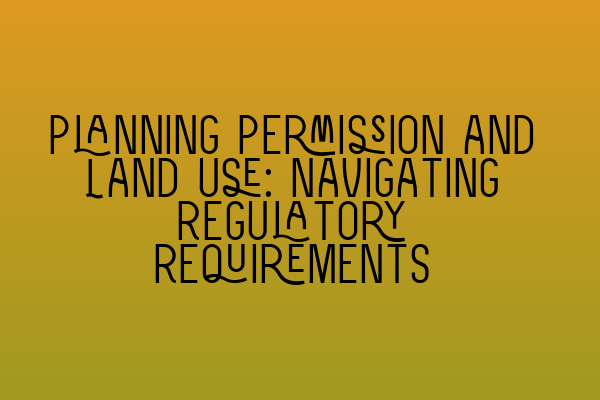Planning Permission and Land Use: Navigating Regulatory Requirements
When it comes to property development, understanding the complexities of planning permission and land use regulations is essential. Navigating through the regulatory requirements can be a challenge, but with the right knowledge and guidance, you can ensure a smooth and successful project. In this article, we will explore the key aspects of planning permission and land use, providing you with insights and tips to help you navigate this critical phase of property development.
What is Planning Permission?
Planning permission is the legal consent required from the local planning authority for certain types of development. It ensures that the proposed development aligns with the local development plan and meets the necessary standards and regulations. Without planning permission, you may face legal consequences or be required to demolish or modify the development at a significant cost.
Whether you are planning to build a new residential estate or a commercial development, obtaining planning permission is crucial. The process involves submitting a planning application to the local planning authority, providing detailed plans and supporting documents outlining the proposed development. The authority then reviews the application and considers factors such as environmental impact, infrastructure requirements, and compliance with local policies.
Understanding the Land Use Regulations
Land use regulations dictate how land can be used and developed. These regulations are put in place to ensure that development is controlled and does not have a detrimental impact on the environment, infrastructure, or the surrounding community. It is important to consult the local planning authority to understand the specific regulations and restrictions associated with your proposed development.
There are various land use classifications, including residential, commercial, agricultural, industrial, and recreational. Each classification comes with its own set of rules and guidelines. For example, residential areas may be subject to restrictions on building heights or the number of units that can be built. Commercial areas may have regulations regarding parking spaces or the types of businesses that can operate in the area.
Tips for Navigating Planning Permission and Land Use
1. Research and Consultation: Before starting any development project, conduct thorough research on the local planning policies and consult with professionals such as solicitors and land use experts. They can provide valuable insights into the regulations and help you understand the specific requirements for your project.
2. Engage with the Local Community: Community engagement is a critical aspect of the planning permission process. Involve local residents and business owners to understand their concerns, address any potential issues, and garner support for your project. Building positive relationships with the community can enhance your chances of obtaining planning permission.
3. Prepare a Comprehensive Planning Application: The quality and accuracy of your planning application can significantly impact the decision-making process. Ensure that your plans are detailed, adhere to local policies, and address any potential objections or concerns that may arise. Seek professional advice to ensure all the necessary documents are included and meet the required standards.
4. Engage with Professionals: Working with professionals such as solicitors who specialize in property law and land law can be immensely valuable. They have in-depth knowledge of the regulatory framework and can guide you through the planning permission process, ensuring compliance with all relevant laws and regulations.
Conclusion
Navigating the regulatory requirements of planning permission and land use is crucial for a successful property development project. Understanding the intricacies of the process and engaging with professionals can help you overcome challenges and increase your chances of obtaining planning permission. Remember to conduct thorough research, consult with experts, and engage with the local community to ensure a smooth and successful development.
If you are preparing for the SQE exams related to property law and land law, check out our related articles for practice exam questions and preparation courses:
– SQE 1 Practice Exam Questions
– SQE 1 Practice Mocks FLK1 FLK2
– SQE 2 Preparation Courses
– SQE 1 Preparation Courses
– SRA SQE Exam Dates
Good luck with your property development ventures and exam preparations!
